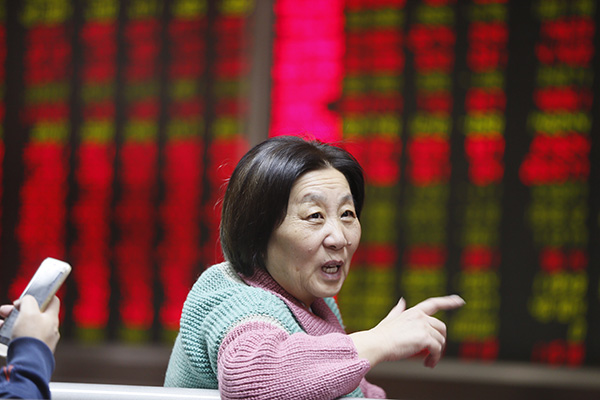Stabilizing stock market requires policy review
Updated: 2016-01-15 07:59
(China Daily)
|
||||||||
 |
|
An investor at a brokerage in Beijing on Dec 7, 2015. Experts said the A-share market will be more liquidity-driven next year as policymakers in Beijing will launch more measures to stimulate the economy. [Cao Boyuan/China Daily] |
By ruling out immediate stock listing reform on Wednesday, China's securities watchdog may have temporarily saved the main stock indexes from falling below the lowest point reached last summer. But it is far from enough to put the stock market back on the track of healthy development.
The regulatory watchdog should make efforts to clear the confusion over the implementation and effects of the new stock market policy because investor sentiment is yet to recover from the repeated plunges of Chinese shares. Though the benchmark Shanghai Composite Index barely managed to climb up the psychologically important threshold of 3,000 points on Thursday, it has lost 15 percent in the first two weeks of this year.
Had the stock market been allowed to drift downward amid fears that the forthcoming shift of stock listing from an approval-based mechanism to one based on registration would lead to a surge in stock supply soon, it would have been possible that retail investors would flee the tumultuous market and undermine the hard-won mild recovery achieved in autumn and winter after the rout last summer.
In this sense, it is necessary for the China Securities Regulatory Commission to take actions to prevent the stock market from falling to the point it reached last year. Yet by citing procedural reasons to assure investors that the expected stock listing reform will not be implemented shortly after March 1 as thought, the securities watchdog has only cleared the minor concerns of investors.
True, there will be no imminent surge in stock supply under the new mechanism as the securities regulator needs time to draft rules for the registration-based stock listing and solicit public opinions on the draft. Also, the securities watchdog can ensure no immediate autonomy for issuers to price their shares.
But all this will not help investors understand and accept the necessity of the ongoing stock listing reform which, if properly implemented and supervised, will do a lot to make pricing of shares more reasonable, stock listing more inclusive and the interaction between the stock market and the real economy more robust in the long run.
The extreme volatility of Chinese shares, a result of multiple reasons, certainly calls for the securities watchdog to take crisis management measures time and again. But a clear message from the securities authorities is badly needed to explain how the stock market will be reformed and supervised to boost investors' confidence in its long-term performance.

 Heartfelt wishes
Heartfelt wishes
 Monkey portraits by Chinese ink painting masters
Monkey portraits by Chinese ink painting masters
 SWAT members hold romantic wedding in E China
SWAT members hold romantic wedding in E China
 Stephane Peterhansel regains Dakar Rally lead
Stephane Peterhansel regains Dakar Rally lead
 Goodbye to steam trains
Goodbye to steam trains
 Top 11 events in the wearable sector in 2015
Top 11 events in the wearable sector in 2015
 Execs introduce new models at Detroit Auto Show
Execs introduce new models at Detroit Auto Show
 Foreigners learn mushroom cultivation skills in Xi'an
Foreigners learn mushroom cultivation skills in Xi'an
Most Viewed
Editor's Picks

|

|

|

|

|

|
Today's Top News
National Art Museum showing 400 puppets in new exhibition
Finest Chinese porcelains expected to fetch over $28 million
Monkey portraits by Chinese ink painting masters
Beijing's movie fans in for new experience
Obama to deliver final State of the Union speech
Shooting rampage at US social services agency leaves 14 dead
Chinese bargain hunters are changing the retail game
Chinese president arrives in Turkey for G20 summit
US Weekly

|

|







